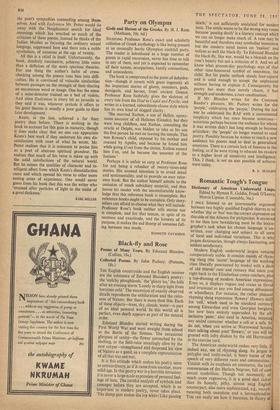Black-fly and Rose
Poems of Many Years. By Edmund Blunden. (Collins, 18s.) Collected Poems. By John Pudney. (Putnam, 18s.)
THE English countryside and the English seasons are the substance of Edmund Blunden's poetry :
the `stolchy ploughlands,' the `glinzy ice,' the hills after an evening storm 'Lonely in sharp light from horizons cold.' The succession of exactly observed details reproduces the exhilaration and the calm- ness of Nature. But there is more than this. Each of these objects—trees, sky, clouds, water—is part of an ideal pastoral world. In this world all is perfect, even death appears as part of the natural order.
Edmund Blunden started writing during the First World War and went straight from school to the Battle of the Somme. The occasional glimpses of sanity—the flower untouched by the shelling, or the field-mice amazingly alive by the new corpse—strengthened and deepened his view of Nature as a good, as a complete representation of all that was not war.
It is this attitude which makes his poetry seem so extraordinary, as if it came from another, more solid age. In this poetry war is a horrible intrusion; it is never a large-scale expression of personal feel- ings of hate. The careful analysis of symbols and concepts before they are accepted, which is so important to modern poetry, never takes place. 'The damp gust makes the ivy whirr/Like passing death;' is not sufficiently analytical for modert taste. The simile seems to be the wrong way rounc because 'passing death' is a literary concept whid we can no longer make much of. A rose may Ix beautiful and therefore may symbolise innocence but the modern mind insists on 'realism' and notices as well the black-fly. To Edmund Blunden the black-fly, like war, would be a blemish on the rose's beauty but not a criticism of it. And we all know what present-day psychology says of that other time-honoured symbol of innocence, the child. But his poetic outlook stands four-square and is solid enough to accept the unpleasant without having to explain it. Consequently his poetry has more than merely charm, it has strength and tenderness, a rare combination.
If Mr. Blunden writes for the Common Reader's pleasure, Mr. Pudney writes for the 'people,' celebrating the 'people.' During the last war he celebrated the RAF with a monumental simplicity which has since become notorious— notorious perhaps because the audience for whom it was written didn't last long enough to become articulate : the 'people' no longer wanted to read poetry. Possibly because he wishes to reach a new audience his poems tend to deal in generalised emotions. There is a certain lack of fineness in the feeling, as if he were trying to educate his readers to a higher level of sensitivity and intelligence. This, I think, is not an aim possible of achieve- ment today.


































 Previous page
Previous page